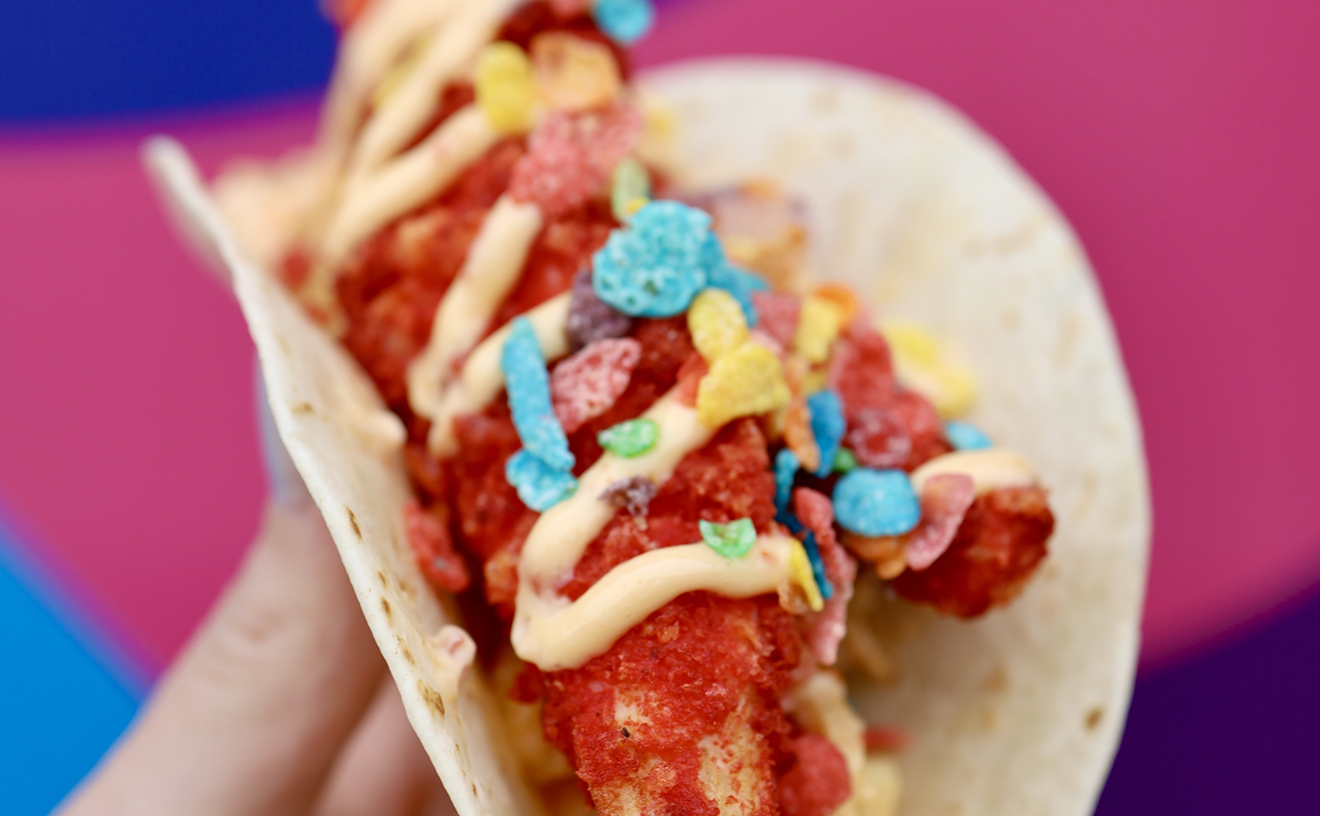"Undersell and overdeliver." That's the philosophy of restaurateur David Chang, as recently expressed on The Charlie Rose Show. Mr. Chang, as most epicures know, is chef/owner of three hugely popular and critically acclaimed Momofuku noodle and ssäm bars in New York City. As recipient of the 2007 James Beard Foundation Rising Star Award and its 2008 winner for Best Chef in New York City, Chang can charge pretty much any price he wants. But as he explained to Charlie: "You go to a fancy restaurant, or a place that you want to have a great meal, and you leave, and you've spent several hundred dollars, and you feel like you've been ripped off a little bit." His goal, he went on to say, is to "make delicious food of value to the customer." A bowl of Momofuku ramen is a meal in itself, with noodles, braised Berkshire pork, peas, bamboo shoots, and poached organic egg in a bacon-shiitake broth. It costs $14 — which will perhaps purchase an appetizer at a typical SoBe restaurant.
Tap Tap is no Momofuku. For one thing, the food is Haitian, a cuisine not overly dependent on ramen noodles. Also, chef James Hinefield's credentials don't curry comparison with Chang's, even if the native of Jean-Rabel (in the northwest corner of Haiti) does deliver deftly prepared island specialties. Yet there are similarities, most notably the communal vibe of both places and the shared proprietary notion of trying to provide the best food for the money.
Take the red snapper: a whole fish crisply fried head, tail, and all, curled on the platter like some specimen on a fisherman's trophy; when the fleshy white flakes are swept into a dish of vinegar flecked with tomatoes, onions, and Scotch bonnet peppers, it makes for a mighty tasty bite. As with most entrées, a disk of cleanly fried tostone comes alongside, as does choice of white rice with a cup of soupy black beans, or the two combined. At $19, snapper is the highest-priced item on the menu.
Savory rice and pigeon peas chaperoned a bowl of stewed goat and chayote in a tomato-based sauce that, with the meat (small pieces of which must be plucked from cleaved bones), was strangely reminiscent of pot roast. Good, goaty pot roast.
There are no bones to pick from fried pork chunks (griot), though health-conscious diners will want to peel the cubes of shoulder meat, which is marinated in sour orange juice and a touch of Scotch bonnet peppers, from caps of sizzled fat. A grilled half-chicken, touted on the menu as free-range, possessed a smoky poke of flavor but arrived undercooked. Once corrected, it was fine, and a heckuva huge bird for $12 — especially considering it's served with the aforementioned starches as well as fresh vinegar-based cabbage slaw. A jar of far more piquant cabbage salad ("picklies") sits on each table, and although some dishes here can be categorized as spicy — shrimp or conch creole come to mind — the incendiary Scotch bonnet is sparingly applied.
Though servings are generous, you'll likely be tempted to sample some sides. Malanga fritters were a favorite, the airy cigars of softly mashed starch even better when accented by tart watercress dip. Mayi moulen scored as a peasanty porridge of white cornmeal cooked with red beans, but fried yuca sticks were yucky — too hard and dry to digest. I generally like these enough that I tried them again on a second visit, unfortunately with the same results. Okra in mild tomato sauce will please only aficionados of these slippery, seedy pods. Accompaniments range from $3 to $5; some places charge more for bread.
Tap Tap's predinner basket is plumped with warm, crusty branch-shaped baguettes. Butter is brought, too, but you might want to dunk the bread in pumpkin soup, a thin, bright orange broth stocked with leeks, cabbage, potato, and malanga. Satisfying salads are simple affairs of romaine leaves topped with vegetable medleys of one sort or another — avocado, tomato, onion; beet, potato, watercress; mango, watercress, shredded carrots....
The most complex combo is salad chiktay: a long center-cut avocado wedge stuffed with freshly fishy herring salad. Nothing beats a cold beer with herring (except maybe cold borscht), and Tap Tap taps Guinness and Bass, and boasts a bevy of import bottles including the Haitian Prestige. A full beverage menu also offers inexpensive wines and a bunch of breezy cocktails culled from aged Barbancourt rum and fresh tropical fruit juices — half-price Tuesday through Friday from 5 to 7 p.m. (and also available unspiked).
On the nights we visited, Tap Tap was plum out of coconut pudding and sweet potato pie — two popular Haitian treats. The moist, dense, pound-cake-like gato ayisyen will satisfy those who are only mildly sweet-toothed, and gato ananas will sate the same a bit more, for it comes with a slice of caramelized pineapple draped over the top.
The décor is also over-the-top: walls, ceilings, tables, and chairs throughout four small dining rooms, a bar area, and an outdoor porch (facing Fifth Street) are splashed with joyfully vibrant paintings and murals crafted by artists from Haiti. Their contribution is an act of solidarity with owner and fellow artistic spirit Katherine Kean, a Haitian documentary filmmaker who since opening Tap Tap in 1994 has used the space to vigorously promote the cuisine, art, and music of the island's culture (live Haitian folk-jazz by Manno Charlemagne and the Tap Tap Band fills the air Thursday and Saturday evenings beginning at 8).
Longtime general manager Gary Sanon-Jules plays a key role in this cozy joint's comforting amiability. For years he has warmly greeted diners, many of whom appear to be regulars, with a friendly, familiar face. Food writer Arthur Schwartz once said the best restaurant is the one where the waiter knows your name. Tap Tap may not be Momofuku, but its caring, value-conscious heart beats in sync with the community like no other place on South Beach.











